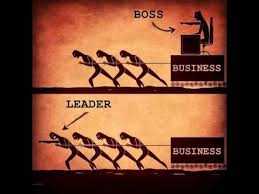To quote Peter Drucker, “Management is about doing things right, Leadership is about doing the right things”.
A leader provides direction (short and long range focus) and answers the “What and why?” (a manger answers the ‘how to’). Leaders provide the strategic direction of an organisation (where to play and how to win) and establish the all-important culture and environment of an organisation. Without direction, focus, clear communication and the right culture, businesses struggle to succeed in today’s market.
Throughout my career in sales, management and consulting, I have regularly witnessed examples of good and poor management; and I have also found all good leaders share similar traits. Good leaders are/have/do:
- results oriented
- not accepting of the status quo
- strong inter-personal skills
- know their own strengths and weaknesses
- creative and innovative
- set goals that are clear, challenging and realistic
- empower others
The performance of the businesses led by leaders with these traits were always above average. This is supported by 2010 research by Zenger-Folkman who found that poor leaders (bottom 10%) lose money, good leaders (the middle 80%) make money and the extraordinary leaders (top 10%) make double the profits of the other 90% combined.
The business world is littered with the corpses of poor leaders and this is usually a result of a sense of entitlement, poor communication, lack of vision, poor governance, taking imprudent risks, lack of integrity or simply being dishonest.
Great leaders like Richard Branson, Steve Jobs, Jeff Bezos and Howard Schultz are successful largely due to the culture they create and the direction they provide. People perform better in an environment of trust and where they have a clear understanding of the businesses direction and the value of what they are delivering to the customer. My experience has been that staff of good leaders are more highly committed to the business, are more satisfied with and enjoy their work and are less likely to leave. All of this helps create a more stable environment which in turn leads to higher profits. Good leaders are also visionary, innovative and focussed on the market ensuring the businesses they run stays a step (or several) ahead of their competitors and they create opportunities rather than wait for them to come.  This creates the opportunity to generate greater revenues and in turn improved bottom-line. And good leaders unite all areas of a business ensuring the involvement of all personnel in generating greater revenue and profits. They minimise misunderstandings, miscommunication and maximise participation, understanding and stakeholder engagement, thus improving profitability.
This creates the opportunity to generate greater revenues and in turn improved bottom-line. And good leaders unite all areas of a business ensuring the involvement of all personnel in generating greater revenue and profits. They minimise misunderstandings, miscommunication and maximise participation, understanding and stakeholder engagement, thus improving profitability.
 This creates the opportunity to generate greater revenues and in turn improved bottom-line. And good leaders unite all areas of a business ensuring the involvement of all personnel in generating greater revenue and profits. They minimise misunderstandings, miscommunication and maximise participation, understanding and stakeholder engagement, thus improving profitability.
This creates the opportunity to generate greater revenues and in turn improved bottom-line. And good leaders unite all areas of a business ensuring the involvement of all personnel in generating greater revenue and profits. They minimise misunderstandings, miscommunication and maximise participation, understanding and stakeholder engagement, thus improving profitability.When Optus, Australia’s second telecommunications company was launched, many questioned the appointment of Bob Mansfield as CEO. After all, he was once the head of McDonalds Australia. What do hamburgers have to do with a telephone company? However, Bob was there to build and lead a company, not build a telecommunications network. Bob created an environment of trust, collaboration, empowerment, fun and dare I say rebellion against the staid culture that was traditional in the industry. He walked the floors of the offices every morning and took time to meet and listen to staff and most importantly communicate his vision for the business. The result was very supportive staff, the ability to attract top people and a desire from all to ‘go beyond’ and beat the incumbent. Bob established a strong foundation on which to build a successful business. Sadly, when Bob moved on his open floor-plan was replaced with closed executive offices, he successor was rarely seen ‘on the floor’, there was a lack of communication from the top and a lack of direction. The business results reflected this.
Over the years, I have been lucky to work for many who had the title ‘manager’ but were in effect ‘leaders’, and very good ones. Fortunately, one of these took me aside early in my career and taught me the difference between directing and leading. Without this I may have been one of the corpses littering the business world.
